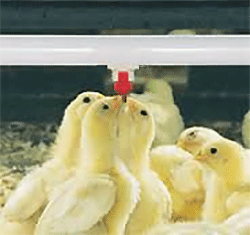in-VIGOR-ate®
Chick Start Impacts Livability
Chick Start Impacts Livability
Early Chick Mortality
Chick start feed reduces early chick mortality, which is a common problem within the broiler industry. Understanding factors that impact getting chicks started post-placement allows for use of beneficial intervention strategies.
Challenges
A large portion of the total mortality for the growing period occurs following placement into the brooder house. Causes –
- A dehydration problem at 3-4 days post-hatching.
- A starvation problem at 5-7 days post-hatching.
Strategy to invigorate your chicks
Water is the most important nutrient for the newly placed chick. Make sure it is fresh and available.
- Water intake stimulates feed intake.
- Key nutritional fortification of the drinking water with in-VIGOR-ate® promotes a vigorous start.
in-VIGOR-ate®
is specifically formulated to encourage water intake. Key nutritional components –
- Acidification to enhance water palatability.
- Acidification to promote desirable microflora development in the gut.
- Electrolytes that promote hydration.
- Lactobacillus acidophilus and Bifidobacterium longum to “inoculate” the gut.
- Vitamins to support immune function and energy metabolism.
in-VIGOR-ate®
Is recommended for use during the first two weeks post-placement in the brooder house to prevent early chick mortality. It has been consistently reported to promote chick vigor and livability.
